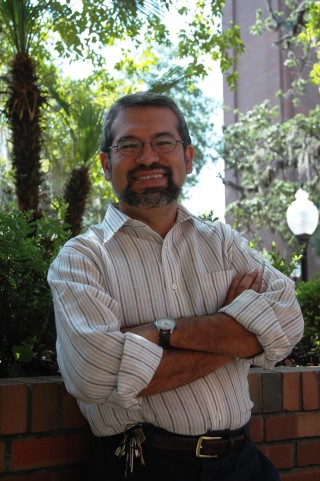Manuel A. Vásquez, professor of religion at the University of Florida and director of the interdisciplinary Program for Immigration, Religion, and Social Change, sat down with PRRI senior editor MacKenzie Babb to discuss the findings of PRRI’s recent survey on immigration reform.
 What’s the key takeaway from PRRI’s recent survey, What Americans (Still) Want from Immigration Reform?
What’s the key takeaway from PRRI’s recent survey, What Americans (Still) Want from Immigration Reform?
That would have to be the consistency of support from the American people for the proposal for immigrants who are currently living in the United States undocumented to become citizens. I think that’s a key finding because it shows that despite all the ups and downs of the political game in Washington, there’s pretty much a generalized consensus among Americans that this is the best way to proceed. With 63 percent of Americans agreeing on the need to provide a path to citizenship, including majorities of both major political parties and all religious groups, the message is very clear that we should move ahead with this provision as part of the comprehensive immigration reform policy.
Do you think the recent support by some evangelical Protestant leaders for immigration reform has had an effect on the national debate?
Well, for a long time, evangelical Protestants were divided. On the one hand, the group had Christian sympathy for immigrants, particularly Latino immigrants, who are heavily charismatic and present a set of values that are very similar to those held by evangelical Protestants. On the other hand, the group expressed support for the idea that the United States is a nation of laws, and that anyone who would come to the country without proper authorization was violating the law and as a result should pay the consequences of that decision. But I think that now, that division is being bridged by a move toward a more compassionate, more accepting view toward the reality of undocumented immigration, and I think it has to do with the fact that a lot of these undocumented workers are part of churches and active members of religious communities and congregations. It’s a question of meeting immigrants face-to-face in many cases, and finding that they are real human beings who are good, moral people and who, perhaps because of circumstances beyond their control, were forced to make the very tough decision to come across the border without proper authorization. So I think that kind of personal touch and the building of those kinds of personal relationships have moved the evangelical community in the direction of supporting a path to citizenship, and that has played an important role because it brings a moral language to the debate on immigration reform. It’s no longer just a question of business, as there’s a moral argument being made to grant citizenship to these immigrants who are members of our community.
What do you make of American public opinion on the specifics of the comprehensive immigration reform bill that passed the Senate earlier this year, including the proposed fines and fees, waiting periods, and increase in border security?
On their response to the proposed $4,000 per person in fines and fees during the citizenship process, Americans seem to be saying that access to citizenship should not be an issue of money. You don’t want to make it so expensive that people who are toiling sometimes two or three jobs to make ends meet won’t be able to enter the path toward citizenship. I think the American people would like to integrate immigrants in an orderly fashion that allows them to enter the process in a fair, equitable manner while not displacing the immigrants who are currently standing in line.
A strong majority of Americans agree that the 13-year waiting period is too long, and are open to speeding up the process. Americans want immigrants to contribute right away to both our society and our economy rather than keeping them waiting for 13 years to be able to be full participants in the American experience.
One of the things that really strikes me is the support folks show for increasing border security. Boosting the number of border security agents and fencing along the border at the cost of $46 billion would require a major investment of money and resources and may see a limited return, since immigrants are likely to continue entering the country illegally without transnational approaches that address the root causes of this phenomenon.
If most Americans support reform, why haven’t lawmakers been able to pass measures to change the immigration system?
There was a sense of urgency right after Obama was elected, both from the Democratic and Republican Parties, to address the issue of immigration right away due to the significant role Hispanic and Asian voters played in the vote. Because of circumstances like the economy and healthcare being at the forefront, immigration didn’t come to the floor right away. Right now, I don’t see reform happening until the 2016 presidential elections, when candidates will have to contend with the national and state-wide picture of majority support for changes to the system. That’s when I think you’ll probably see a break in the logjam that’s happening at the local level in the House of Representatives, as there’ll be a perceived urgency to move on immigration reform in order to deal with an issue central to groups set to play a major role in key battleground states in the 2016 election. Even now, there’s a broad understanding that this is a problem that needs to be addressed, it’s just a question of when the political forces and processes will allow for this realization to be converted into actual policy reform.




